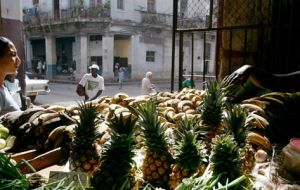MercoPress. South Atlantic News Agency
Cuban farmers pushing for greater autonomy to produce and sell crops
 Government distribution last year resulted in the loss of tons of fruits and vegetables
Government distribution last year resulted in the loss of tons of fruits and vegetables Cuban farmers are pressing for greater autonomy to produce and sell their crops, blaming government inefficiency for Cuba’s falling food output despite agricultural reforms introduced by President Raúl Castro.
In meetings around the country, they have complained that the government is not providing the inputs they need and has failed in its basic role of getting their produce to market, according to meeting participants and media reports.
Their claims and requests, which are being aired at meetings of the National Association of Small Farmers, are significant because they seek to move away from government control of agriculture, which has been one of the pillars of the Castro brothers’ regime.
At issue are regulations guaranteeing the state’s near monopoly of the distribution system through its long-standing practice of contracting for 75% of what farmers produce in exchange for supplying fuel, pesticides, fertilizer and other supplies otherwise not available.
The farmers say the state often fails to deliver inputs when they need them and undercuts production by not picking up and distributing crops in a timely fashion, which leaves their produce rotting in fields and warehouses.
The latter has become such a problem that Cuba’s state-run press recently reported that farmers basically want the state to get out of the way.
“Participants raised the need to do away with the system of distribution — and allow co-operatives to bring their products directly to market,” the National Information Agency wrote about a meeting of Havana province farmers attended by Cuba’s First Vice President Jose Machado Ventura.
Raul Castro has made food security his signature issue since taking over from his older brother Fidel Castro two years ago.
Cuba because of its inefficient agricultural production spends heavily hard currency to import two-thirds of its food.
Castro has raised prices the state pays for produce, leased state lands to farmers, decentralized decision making and allowed some farmers to sell a small part of their produce directly to consumers at fixed prices.
The reforms last year spurred production of bumper crops of tomatoes, garlic and other items, but the state could not deal with the abundance and failed to get all the produce to market, resulting in the loss of tons of fruits and vegetables.
This year, farmers say that despite the reforms, production has fallen because the state did not provide fertilizer and pesticides when they needed them.
Cuba’s 250,000 family farms and more than 1,000 private co-operatives represent the largest private sector in the state-dominated economy. They produce 70% of the locally grown food even though they own only 20% of the land.




Top Comments
Disclaimer & comment rulesCommenting for this story is now closed.
If you have a Facebook account, become a fan and comment on our Facebook Page!